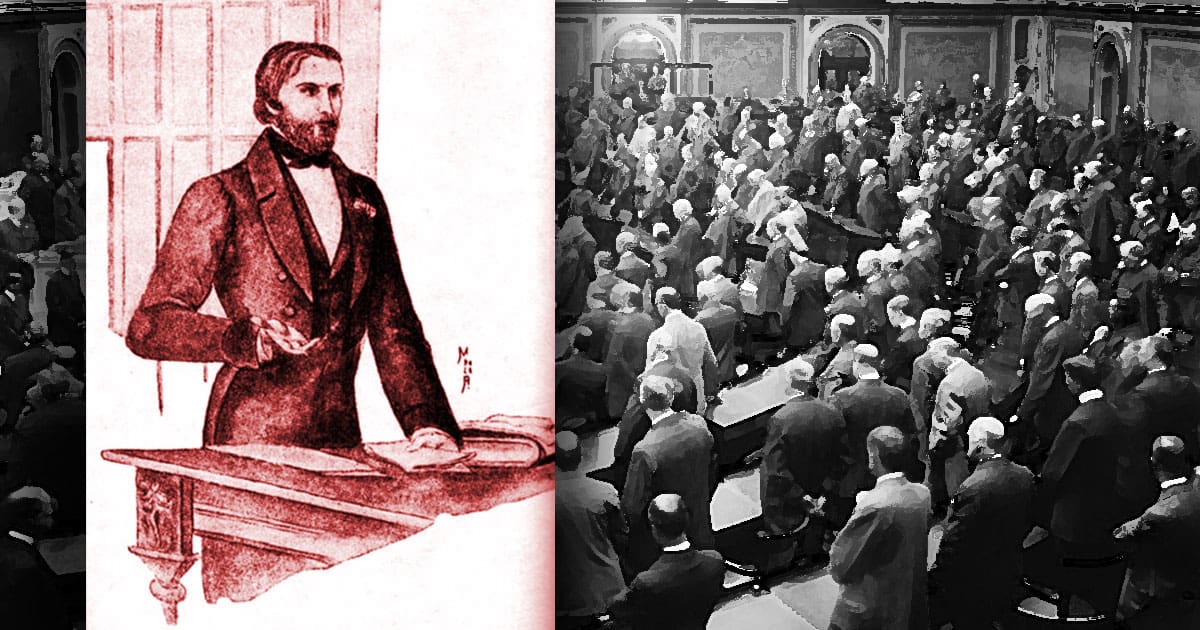Imagine! Frederic Ozanam Addresses Congress
After viewing the presentation of Sr. Claire Sweeney, DC on Frederick Ozanam and Social Justice, I fantasized what he might say if he, like Pope Francis, were invited to address a joint session of Congress.
She points out …
He studied, he wrote, he spoke, he led his friends in action– all to promote the cause of justice. Ozanam wanted to see society reformed through debate and social action, not through revolution. He believed that ‘truth which will rise up to judge political systems’. Ozanam took an active part in political debate.
What did he say?
She offers the following insights and features his own words.
His vision was always gospel-based. He saw no dichotomy between the principles of liberty, equality, and fraternity of the 1789 Revolution and the principles of the gospel:
‘I recognize the temporal advent of the Gospel expressed by these three words: liberty, equality, fraternity.’ He declared himself ‘to be passionately in favor of liberty, in favor of the legitimate triumphs of the people, in favor of reforms which uplift’.
He wanted to engage everyone in the justice question and warned of the dangers of losing the support of any strata of society in the struggle for justice. He wrote to Alexandre Dufieux, April 1851:
‘… Let us principally learn to defend our convictions without hating our adversaries, to love those who think differently than we do, to recognize that there are Christians in all camps and that God can be served today as always.’
He knew it would be unwise to disengage from the class struggle, or to stand with one side and cut off dialogue with the other. Writing to Léonce Curnier, March 1837, he said:
‘Christians [must] interpose themselves between the camp of the rich and the camp of the poor’ in order to bring about reconciliation between them.’
He did not support any political system in particular, but believed [as shown in a letter to Ernest Falconnet, 1834] that political systems, in general, should work for the good of the people:
‘I declare neither for nor against any government combination, but accept them as instruments for making man happier and better. If you want a formula, here it is: I believe in authority as a means; in liberty as a means; in love as the end.’
What did he do?
With some friends, he founded a Newspaper, L’Ere Nouvelle, to provide an opportunity to discuss justice issues in a Christian context. Some of the articles he published in L’Ere Nouvelle include: “The Causes of Misery” “From Help Which Humiliates to Help which Honors”, “Dangers of Charity” and “On Legal Charity”.
Meetings in the homes of the learned men of Paris …he used these and every other means at his disposal to promote justice for the poor. He regularly published articles and editorials in major newspapers promoting his views on justice and truth.
Pope Francis’ historic address to a joint session of Congress
After addressing many specific issues, he quotes Thomas Merton:
“I came into the world. Free by nature, in the image of God, I was nevertheless the prisoner of my own violence and my own selfishness, in the image of the world into which I was born. That world was the picture of Hell, full of men like myself, loving God, and yet hating him; born to love him, living instead in fear of hopeless self-contradictory hungers.”
Merton was above all a man of prayer, a thinker who challenged the certitudes of his time and opened new horizons for souls and for the Church. He was also a man of dialogue, a promoter of peace between peoples and religions.
Honoring our heritage
- What do the words “liberty, equality, fraternity” mean in our present context?
- “What must be done? What must I do?” – The Vincentian Questions!









0 Comments